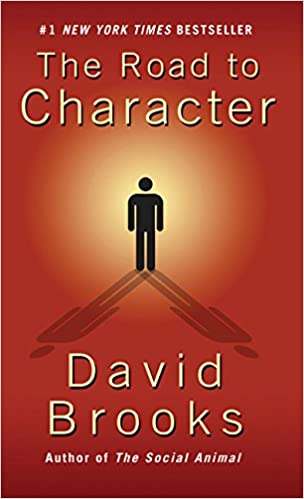As Arianna Huffington, the founder of the Huffington Post, said, “We need to accept that we’ll screw up royally sometimes. Failure is not the opposite of success, it’s part of success.”
Failing, making mistakes, or as Huffington so eloquently puts it, “royally screwing up” is actually an imperative part of anyone’s journey. What makes you different from others is that you learn from these failures, wield them, and use them to come out better in the end.
Today, we’re talking about how to build your character through failure and mistakes in your career. That corporate ladder? That promotion you’re after? Your goals for your business? These are all within reach. Keep reading to find how!

The Road to Character
by David Brooks
⏱ 14 minutes reading time
🎧 Audio version available
Accept that Mistakes Are Gifts
When you’re in the throes of workplace drama and tension after making a mistake, it can feel like the world is crashing down around you. You may think to yourself, “This is it. The screw up. My career is about to crash and burn in front of me.”
We can assure you that that is not the case. Alright, now, take a deep breath, and reconfigure your mindset.
Something a lot of workplaces get wrong is they teach employees that a single mistake will ruin their career. And you know what? This is exactly the mindset that dramatically suppresses innovation, because you can’t have innovation without leaving space for trial and error.
So, the first thing you need to do is accept that mistakes happen and are gifts. This gift has been offered to you. It’s going to help you grow. It’s going to make you rethink your approach. It’s going to teach you a lesson.
“When You Know Better, You Do Better”
These are the words of Maya Angelou. Failures teach us something. They point out a flaw in our plans or product.
More importantly, she’s saying is that it’s okay to forgive yourself for the mistakes you’ve made in the past. And as you grow from these failures, you learn new things. In fact, you’ll begin to see issues in an entirely new light.
Stop Playing the Blame Game
Everyone has done this at least once. The blame game. When something goes awry, panic and pointed fingers are often the immediate reaction. But, that’s not how you build your character. It’s important to take responsibility for your mistakes– and not only that, but to be comfortable with them.
Shifting the blame, playing the “who did it” game is the opposite of development. Remind yourself that the faster you acknowledge your failure, the faster you’ll succeed.
Demonstrate Your Resilience
You probably don’t know the extent of your strength and the power of your resilience until you’re put on the spot. And equally important, your coworkers and bosses don’t know how resilient you are yet. This is the moment to share with them how powerfully you can bounce back.
You’re not going to build up your resilience by just breezing through life. There is no such thing. No, you need challenges, obstacles, and unfortunately, failures to help build your character. The only way you’re going to find these is through making sense of a mistake. Continuing on after a failure will show you just how capable you truly are.
These are the moments you’re going to reflect back on as the moment you realized how much you can accomplish and just how incredible you are. You’re developing a thicker skin by the moment. The next time you go after something, you’ll have a much better idea of how to get there, because you’ll remember what went wrong last time and how to fix it.
Own Up To Your Mistakes
Failing is an art. But to master this art, you first need to own up to it. Having an idea or a project fail at work and having a manager pointing fingers about who should take the fall sounds like an all too familiar scenario.
Being strong enough to accept accountability is a trait that doesn’t just fall on leaders in the workplace; it’s something every entrepreneur, freelancer, business owner– scratch that, everyone should have. Admit when you’re wrong, and exactly what you did wrong.
This can be a difficult thing to do. However, once you cross that threshold, you’re showing that you are willing to learn from your mistakes, try new things, and take steps to prevent the same mistake from happening again. This way, you can build your character into one that turns failure into success.
Use It For Motivation
Be like the Walt Disneys and Michael Jordans of the world. Use your failures as a precious source of motivation. Walt Disney was told he wasn’t “creative enough” before he went on to found Disney. A 15 year old Michael Jordan wasn’t accepted into his high school basketball team.
He didn’t quit. Sure, he went home and cried. But that summer he trained hard– trained so hard that he eventually made the team and became, arguably, the greatest basketball player in history.
Instead of giving up and letting failure crush you, turn it into a source of motivation. The frustration you feel at not achieving your goal? That’s fuel, powering you to work harder for your next goal.
Accept that Failure Isn’t Final
Having a positive mindset is the ultimate flex when it comes to character building. After experiencing a failure, it’s important to be wise enough to know that this failure isn’t final. The same examples work here too.
After Walt Disney was rejected for what an incredibly blind newspaper called “not being creative enough,” he went on to start a company, which also failed. But, he knew that this failure was just a setback, and that it wasn’t permanent. The third time was the charm.
Broaden Your Perspective
There is a silver lining in making a mistake in your career. Too often, we get so caught up in the pursuit of our career goals that we ignore or forget about other important aspects of our lives.
For example, you can be so focused on putting in enough hours, growing your business, and rising up the ranks that you overwork yourself at the cost of your family, personal life, and even health.
Having character, career-wise, involves being strong and savvy enough to balance your personal life and career.
Know That You’re One Step Closer to Success
And here we are at the end of the road. When in doubt, lean back on the irrefutable fact that a mistake brings you one step closer to success, not farther away.
Instead of working on something and staying cautious because you’re trying to get the timing right, perfect the product to the point of insanity, and show others that you’re essentially bulletproof, realize that it’s a good thing that this failure occurred when it did– and that it’s actually a blessing.
This entire journey is there to allow you to make changes and the improvements you need to grow.
Accept that Not Every Idea is Worth It
There is strength in not giving up on a worthy cause, but there is also power in knowing when to stop trying. Realizing that you failed not because you didn’t give it your best, but because you put your best in the wrong idea can be relieving.
Everyone wants to follow every idea that pops into their heads. And that’s the great thing about failure. It reminds you that not every idea is a good one. Having character includes learning to filter through these ideas, evaluate them, and decide which ones are fit to act on.
One of the best examples of this is Steve Jobs. Before he became one of the wealthiest people in the world, he had a company in shambles. He took one of the most drastic measures of his life. He realized that in order to earn profit, he needed to stop pursuing so many ideas. So, the dozens of products Apple was working on? They were scrapped.
Instead, he selected a handful of product ideas, the iPhone being his greatest focus, and concentrated on them.
There is this term called “failing up” or “failing to success” and it fits perfectly here. The stigma around making mistakes needs a reality check. Mistakes should be acknowledged as an important part of character building. Not only that, but as an essential part of business. How else can we improve ourselves?
What Is Snapreads?

With the Snapreads app, you get the key insights from the best nonfiction books in minutes, not hours or days. Our experts transform these books into quick, memorable, easy-to-understand insights you can read when you have the time or listen to them on the go.


